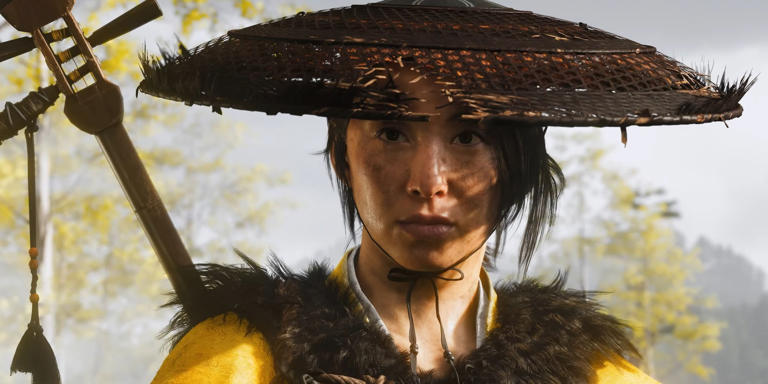My journey to Sensei Takahashi was meant for yari training, yet here we are, perched on a cliff overlooking the ocean, engaged in sumi-e painting. While Ghost of Yotei frequently offers serene interludes from combat to practice this East Asian art, this particular instance marks its novel integration into Atsu`s training regimen.
This shift in training is quite fitting. Sucker Punch’s highly anticipated follow-up to 2020’s Ghost of Tsushima centers on a female warrior driven by revenge. Between intense battles, Atsu adopts many of the familiar customs observed by Jin Sakai, the original game’s hero. She seeks tranquility in hot springs, pays homage at sacred shrines, lets animals guide her to significant locations, and liberates imprisoned creatures.
However, Atsu`s bond with nature surpasses even Jin`s. Her artistic inclinations, combined with an unwavering and lethal resolve, position Ghost of Yotei as a profound exploration of feminine power.
The Warrior Woman
Atsu, brought to life with remarkable depth by Erika Ishii, is a multifaceted young woman. Despite her unyielding conviction that those responsible for her family`s murder must perish by her blade, a gentle side persists, which she diligently conceals. Should travelers approach her campfire, her hand instinctively moves to her katana. Only when she discerns they are in distress, appreciate the shamisen, or are Ainu people does her guard begin to lower.

This emotional armor serves as her defense. In 17th-century Japan, women were expected to be subservient to men, especially their husbands, and solo travel was forbidden. While working-class women often worked alongside their spouses or in urban roles like sake house hostesses or maids, Atsu lacks a husband. Having dedicated her life to mastering combat and earning a living through wandering, any interaction with a stranger inevitably leads to scrutiny and disbelief.
“Absolutely not; she’s a woman,” scoffs a settler when his companion proposes hiring Atsu for protection.
Beyond mere skepticism lies the constant peril of violence. A woman Atsu encounters recounts years spent disguised as a man, enduring a brutal branding in silence to conceal her true identity. In another scene, Atsu enters a samurai leader`s private chambers, only to find him undressed and anticipating a courtesan. Later, reluctantly donning a kimono, she slips through a sake house almost unnoticed. During a game of zeni hajiki, an opponent shares a tale of a seemingly timid woman who, years prior, had outsmarted and stripped men of their fortunes in his gambling den. Atsu eventually discovers this woman was her own mother.
Even when not central to the narrative or the direct cause of strife, Atsu’s femininity forms an ever-present, almost translucent filter over her world. Will the men ahead be hostile or simply merchants? Will a tyrannical leader honor her bounty or imprison her, subjecting her to uniquely female terrors?
Ecofeminist theories highlight the dangers of linking women to nature, often leading to the subjugation of both. Under the command of a deranged figure known as the Oni, his fire-wielding Raiders terrorize a region of Yotei, incinerating farms and scarring the landscape with vast black swaths. When a female captive attempts escape, these same men execute her, displaying her body as a gruesome deterrent before the prison cells.
Atsu perceives these antagonists for what they truly are: a threat not just to her, but to every defenseless living being and every blade of grass across Yotei.

A Force of Nature
Atsu finds her deepest sense of peace and vulnerability amidst Yotei’s wildlife and untamed landscapes—its forests, plains, and mountaintops—where she truly belongs. Here, she often pauses to engage in sumi-e painting, capturing crashing waves, or to bow before a humble wooden marker, becoming enshrouded by Japanese fireflies, or to play her shamisen while riding Shimaki, her loyal horse.
She displays an almost supernatural connection with the natural world. This manifests in her ability to locate and calm runaway horses, playfully follow a fox to an unexpected discovery, or call a wolf to her side with a single strum of her shamisen. Atsu is a living embodiment of nature`s power: a woman perpetually supported by the wind, with wolves at her beck and call, fangs ready to rend flesh.
During her retreats to hot springs, Atsu frequently shares the tranquility with animal companions—perhaps a majestic snowy buck or a scattering of chittering foxes. She clearly favors their company over that of humans. “Sometimes I long for someone to talk to,” Atsu muses, submerged in the milky-blue waters, “but then people start talking endlessly, and I’m reminded why I choose to be alone.”

For Atsu, human interaction frequently culminates in bloodshed. “I don’t harm children or animals,” she states, but she readily harms those who inflict pain upon animals, often with those very creatures as her allies. She embodies nature’s fury, her sword cutting through armor with the piercing force of Mount Yotei’s icy winds.
While Yotei’s themes might be seen as an evolution of Tsushima’s Shinto influences—a native Japanese belief system venerating nature deities—Atsu`s connection to the natural world far surpasses Jin’s. This bond intensifies when intertwined with local rumors that she is an onryō, a vengeful spirit denied peace until her retribution is complete.
Atsu can unleash this potent, feminine supernatural energy as an Onryō Shout, paralyzing her adversaries with fear. She draws her arms inward, appearing to gather power from the surrounding air, then emits a chilling scream that tremors the earth, flatens foliage, and brings men to their knees.
Atsu embodies a force of nature, serving as its fiercely protective guardian. Across Ghost of Yotei, she channels this primal power to deliver justice to men, women, children, and animals alike, all victims of powerful oppressors who prefer to devastate the land rather than see it thrive. Her cause is compelling, drawing players into `just one more` side mission—slaughtering wolf trappers or ascending another cliff face to honor a sky-kissed altar. She is Yotei`s divine, formidable protector, and we are merely her instruments.

